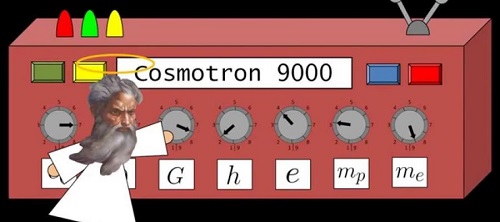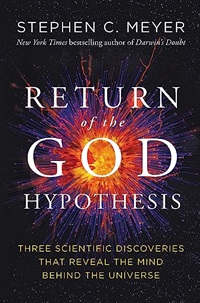The Return of the God Hypothesis, A Skeptical Review of Stephen Meyer's Latest Book (original) (raw)
TRANSLATE THIS ARTICLE
Integral World: Exploring Theories of Everything
An independent forum for a critical discussion of the integral philosophy of Ken Wilber

 Frank Visser, graduated as a psychologist of culture and religion, founded IntegralWorld in 1997
Frank Visser, graduated as a psychologist of culture and religion, founded IntegralWorld in 1997
. He worked as production manager for various publishing houses and as service manager for various internet companies and lives in Amsterdam. Books:
Ken Wilber: Thought as Passion (SUNY, 2003),
and The Corona Conspiracy: Combatting Disinformation about the Coronavirus (Kindle, 2020).
SEE MORE ESSAYS WRITTEN BY FRANK VISSER
A Skeptical Review of Stephen Meyer's latest book
Frank Visser
Abstract by ChatGPT: Stephen Meyer's "The Return of the God Hypothesis" argues theism explains the universe's origin, fine-tuning, and DNA complexity. Rejecting materialism and pantheism, Meyer leans towards theism over deism, suggesting God intervened in history. Critics challenge his logic, emphasizing the lack of evidence for a divine entity physically creating life. The essay contends Meyer's fine-tuning argument lacks a comprehensive God hypothesis, leaving questions about the nature of the designer and specific religious narratives unanswered.
The universe we observe has precisely the properties we should expect if there is, at bottom, no design, no purpose, no evil, no good, nothing but blind, pitiless indifference. (Richard Dawkins)
The properties of the universe and of life... are just "what we should expect" if a transcendent and purposive intelligence has acted in the history of life and the cosmos. (Stephen Meyer).

Stephen Meyer
Stephen Meyer, author of two books from the Intelligent Design perspective, Signature in the Cell (2009) and Darwin's Doubt (2013), has written a voluminous new book on The Return of the God Hypothesis (HarperOne, 2021). In it, he argues that theism offers the best explanation of three scientific discoveries: (1) the universe had a beginning, (2) the universe is fine-tuned for life, and (3) our DNA is so information-rich it cannot possibly have evolved by naturalistic means alone. That is not to say he has proven the existence of a theistic God, let alone his own favorite Judeo-Christian one, but that in his opinion, theism in the general sense offers a "better" explanation than alternative metaphysical explanatory models claim to do.
THEISTIC SCIENCE
Contrary to the received view that religion and science are at war with eachother, Meyer argues that religion, and notably the Christian religion, has made science possible in the first place. Most famous early scientists, like Newton, he reminds us, were devout Christians. It is the monotheistic God, he argues, that provided us with a lawful and intelligible natural world, which we could investigate with our God-given minds. This would explain why science emerged primarily in the Western Judeo-Christian world, and not in earlier cultures. Of course, this view glosses over the fact that the Church wasn't too happy with the scientific facts that the earth moves around the sun (Galileo), or that the sun is just one of many stars (Bruno), or that we have descended from ape-like ancestors (Darwin). The list is endless.
Yet, Meyer argues that religion and science are perfectly compatible, and that many scientists are Christians to underscore precisely that. But human beings can simultaneously believe many incompatible things. And most Christians have already accepted most of the scientific narrative about cosmological and biological evolution. It is only the Young Earth creationists, who believe the age of the earth (and the cosmos) is 6000 years at most, that have out of necessity to reject most of science's findings. Stephen Meyer does not belong to that limited group. But he overstates his case, in my opinion, when he suggests that the Judeo-Christian God—who was less interested in scientific matters than in getting the Jews to believe in him, and not in his local competitors—had the wits to fine-tune the physical cosmos so that it could produce a life-friendly earth planet in about 10 billion years.
Meyer belongs to the Intelligent Design movement, and wants to separate science from naturalism, so that a supernatural "explanation" of the cosmos and life can get a fair hearing. The trouble is that a "supernatural explanation" is a contradiction in terms, for explanations tend to clarify processes for us, however tentative, and the supernatural is by definition beyond our understanding (hence it needs revelation as its infallible source). This causes Meyer's project to be doomed from the start, however much he engages with his critics to show that they avoid the first questions of origin.
METAPHYSICAL MODELS
Briefly, materialism holds that the cosmos is all there is, and can ultimately be explained by natural causes. Pantheism holds that nature is permeated by an unpersonal divine presence. Deism postulates a God that created the universe from the start, but then withdrew from it, and theism believes that God the creator is still active during cosmological and evolutionary history.
| METAPHYSICAL MODELS |
|---|
| THEISM |
| DEISM |
| PANTHEISM |
| MATERIALISM |
In discussing the many problems Meyer deals with in his book, materialism and pantheism are usually quickly discarded, and the final choice between deism and theism is made in the chapter on biological information: since a deistic God could not possibly "preload" this information at the creation of the universe, Meyer needs a God that intervenes at crucial moments in history, even though he is not very explicity about when that exactly happened (the origin of the major phyla, but also of the first flowering plants, the first mammals, the first human being.... and so on?)
Meyer is an Old Earth creationist, more specifically a "progressive creationist", so he accepts most of the scientific narrative about the deep history of the cosmos, the earth and life on earth, with the added notion that at several points in time God "infused" biological organisms with extra genetic information, most notably at the time of the so-called Cambrian Explosion (a beloved topic of creationists, because it supposedly proves that all the known taxonomic phyla "suddenly" arose on the scene around that time. Meyer's reading of this geological era has been widely discredited by scientists[1]).
THREE DISCOVERIES
What are, according to Stephen Meyer, the three discoveries that "reveal the Mind behind the Universe"?
- The universe had a beginning - Meyer argues that from a materialistic perspective we would expect an eternal universe (which was the received view before the Big Bang was postulated.) But the Big Bang theory changed this. If the universe had a beginning, its final cause cannot be part of the natural world, Meyer argues, and thefore it has to be "supernatural". (Physicists might argue that at the Big Bang time itself originated, so this conclusion might be unwarranted).
- The universe is fine-tuned for life - Meyer goes into great detail to list the many physical variables that seem to be "just right" for life, or even a stable universe, to exists. The list seems indeed endless, ranging from the initial conditions of the universe to the expansion rate of the universe, the strength of the four fundamental forces and so on. (Physicist have tried to get around this by postulating a multiverse, with our universe being the lucky one).
- Life is extremely information-rich - Focussing on our DNA, Meyer argues that to get even the simplest code for an enzyme, say C-A-T-T-G-T-A-C-C-T, it would take a chance of 1/410 or 1 in a million to achieve this by random chance alone. Obviously this would not work. Put differently, there are many more ways to get it wrong than there are ways to get it right when it comes to a functional genetic sequence. (Yet, are we to believe that God painstakingly assembled these genetic strings, for all species, all genes, all proteins, and so on? Hardly a plausible explanation)
The problems Meyer charts for us are daunting indeed, but does he offer a viable solution other than faith?
FAULTY LOGIC
Critics like Dawkins have often accused ID-exponents of using the following faulty logic:
- Materialism cannot explain the origin of the cosmos and life.
- Therefore, religion offers a better explanation of the cosmos and life.
Meyer objects to this presentation, or the common accusation of using a God of the Gaps argument, and adds the following clause:
- Materialism cannot explain the origin of information in the cosmos and life.
- We usually observe that information is produced by minds
- Therefore we are justified in postulating a Divine Mind behind the cosmos and life.
Yet, I would add another clause, which Meyer completely ignores:
- Materialism cannot explain the origin of information in the cosmos and life.
- We usually observe that information is produced by minds
- This information is implemented by conscious embodied beings with hands.
And there's the rub. We have no evidence whatsoever of a Divine Person physically creating material and biological realities. A God without hands (or helpers, in the sense of lesser gods), cannot implement the design it has come up with.
So we get:
- Materialism cannot explain the origin of information in the cosmos and life.
- We usually observe that information is produced by minds
- This information is implemented by conscious embodied beings with hands.
- We have never observed Divine Persons physically create matter or life.
- Therefore we are NOT justified in postulating a Divine Mind behind the cosmos and life.
All the fine-tuning of the world cannot take away this fact. This leaves the "God Hypothesis" unconfirmed. Meyer may avoid the God of the Gaps argument, but his is what I would like to call a "God of the Knobs" argument, in which God fine-tuned the physical cosmos so it could (after 10 billion years?) sustain life (on our planet earth only?).

The God of the Knobs. The Christian God fine-tuning the many parameters of the cosmos. Is this really a believable option to explain the status of our cosmos?[2]
NO HYPOTHESIS

Intelligent Design defenders have their mouths full of design, but never talk about the means by which this design -- be it the fine-tuning of the physical cosmos, the origin of the major biological phyla or the human mind -- has been realized. That is the elephant in the design room.
Compare it to webdesign. A designer decides headings and subheadings should have a certain font size and color, and paragraphs should be indented. But it takes a frontend programmer to realize this design, so that it conforms to the specs of the designer. See the problem?
Hence, there is in fact no God hypothesis at all. A hypothesis should offer insight into how processes work out and since God's ways are by definition mysterious, this is a non-starter. With all the sophistication he brings to the topic, in the end Meyer's "hypothesis" is no more than a magical Poof! Creationists would counter: isn't "a universe from nothing" equally magical?
Fair enough, but the primordial matter/energy that gave rise to the universe (if that really can be described as "nothing" is contested) is not on the same footing as a personal Deity capable of many miraculous feats. So from the standpoint of economy I would opt for the naturalistic explanation.
This leaves untouched the question why this theistic designer would be Jehova, and not Zeus or Shiva. Or why a Cosmic Spirit would bother to dictate ten commandments to a leader of a small band of desert dwellers, on a tiny planet like our earth. Or why He would send his Son to this earth to get crucified and resurrected for the salvation of the true believers. Clearly, this is still a theological and/or scientific bridge to far even for Meyer.[3]
Yet, the book is interesting in the way it provides insight into the mind of a creationist, who has take the trouble to read and evaluate all his opponents, including Dawkins, Krauss, Hawking, Carroll and many more, even if he found them all wanting. He does not shy away from quantum cosmology, the multiverse or string theory.
Intelligent Design defenders have their mouths full of design, but never talk about the means by which this design
has been realized.
CREATION DEBATES
As can be seen from the motto's at the top of this review, Meyer turns one of Dawkins' most well-known quotes on its head, and this invites us to rethink what we have always considered to be true. Yet, Meyer's books have received strong criticism from several contradictory corners: Young Earth creationists (e.g. who reject the Cambrian Explosion), fellow Old Earth creationists (e.g. BioLogos, who question his treatment of science) and evolutionary scientists, who have exposed his shallow treatment of evolutionary biology. In the end all creationists grab on every controversy within that field to declare evolutionary theory is "still" in crisis.
To his credit, Stephen Meyer frequently shows up on debate panels with skeptics or other Christian believers, and this particular book originated with a debate in at the University of Toronto, March 19, 2016, titled "What Is Behind It All? God, Science and the Universe." He debated with cosmologist skeptic Lawrence Krauss (author of A Universe from Nothing) and "evolutionary creationist" Denis Lamoureux, who takes a middle position between creation and evolution. Meyer was struck by a migraine attack right before the start of the presentations, but admirably managed to contribute his lecture and his share of the discussions.
Why am I paying attention to Stephen Meyer on Integral World at all? It would be too easy to dismiss him as just a creationist, when at the same time Ken Wilber has used pretty much the same arguments as creationists to discredit evolutionary theory (e.g. quoting Old Earth creationist Hugh Ross in The Religion of Tomorrow). Contrary to Wilber, Meyer does not throw around some slogans to his students, but actually fleshes out his argument in great detail in his books and fearlessly debates his critics, to make his case in the public arena. Wilber's "mystical creationism" might be more sophisticated than Meyer's, but in the end sophistication does not bring us any further, if science is not properly represented and evaluated.
Krauss, Meyer, Lamoureux: What's Behind it all? God, Science and the Universe, Wycliffe College at the University of Toronto, 19 mrt 2016.
NOTES
[1] See for example: Dave Farina, "Exposing Discovery Institute Part 2: Stephen Meyer", www.youtube.com, May 2022.
[2] See also: Frank Visser, From Hydrogen to Humanity, www.integralworld.net, March 2019.
[3] See: John Perry, "The Fine-Tuning Argument for God", www.philosophytalk.org, August 6th, 2015.
Philo, Hume's spokesman in the Dialogues on Natural Religion, agrees by the end that the more likely hypothesis is that the world was created by some sort of intelligent being or beings. But he points out that this doesn't in and of itself provide much evidence for the Christian God—or the God of any other religion, he might have added. How do we know it was one God, and not a committee? How do we know it is benevolent, when the evidence on that issue is so mixed? It's going to take quite an argument to get from fine-tuning to not coveting they neighbor's wife and closing bars on Sundays and the other things some people think they know that God wants us to do.